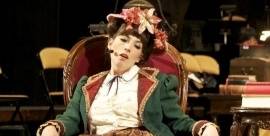When you’ve watched the same movie, seen the same person, heard the same song, eaten the same meal, seen the same play, read the same book, over and over again, you can hardly expect to find something new. Unless that’s what you’re looking for.
I’ve seen My Fair Lady, the movie starring Audrey Hepburn, about five hundred times. Approximately. I was in the stage production in high school, and I saw The Celebration Company’s production many years ago. I’m familiar. (I’m going to go ahead and assume that anyone else reading about this production has seen the musical, live or on film.) So when I heard there would be a “semi-staged concert version” of my old favorite, I wanted to see something I knew backwards and forwards, but different. A “staged concert” is not a play, technically, and it’s definitely not a movie. This production promised to be stripped down, simple. I imagined several music stands and costumed singers. I anticipated classic quips and famous lines that would lead up to well-known songs. I thought some new gems would present themselves on familiar ground. I couldn’t wait.
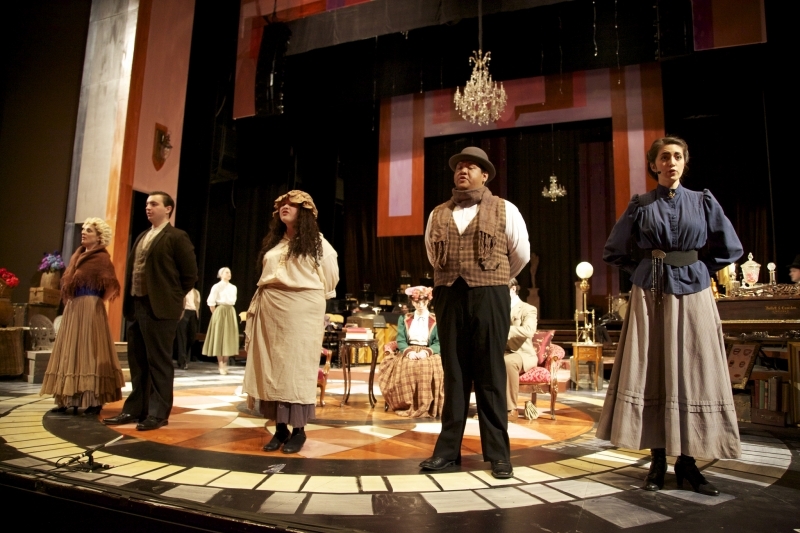
The set was minimal: a chair on each side of the stage and a couple of signature set pieces. The U I Symphony Orchestra provided the music, and both the orchestra and the music were lovely. I’ve heard them on several occasions (already once this season), and I always enjoy the experience. While the orchestra played the opening overture, I looked over my program, wondering which of my favorite songs they would include. As my eyes glanced over the cast of characters, I realized this was not going to be the “semi-staged concert” I was promised. This was going to be a play. The whole play.
Eliza Doolittle was played by Cristin Colvin on the night that I attended. (Wendy Muir portrayed Eliza on alternating nights.) She has a lovely singing voice, strong and pure. Consistent. She opted to sing Eliza’s part as most young women do, keeping the same tone and effect while changing only the pronunciation of English words. I’ve always longed to hear an Eliza whose singing voice becomes more refined as her demeanor does. Of course, this requires a songstress to sacrifice the perceived quality of her voice for the sake of a character, and I’ve not encountered any who 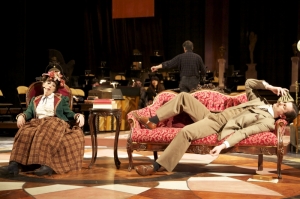 would be willing. I’m not suggesting that these women should sing badly. I merely offer that changing something more than the pronunciation of Eliza’s lyrics may have a more transforming effect.
would be willing. I’m not suggesting that these women should sing badly. I merely offer that changing something more than the pronunciation of Eliza’s lyrics may have a more transforming effect.
Henry Higgins is a pompous ass. He’s lovable, let there be no doubt, but he’s an ass. Timothy Renner played Professor Higgins with the appropriate amount of emotional carelessness and dismissive, self-centered charm that the part requires. His voice is smooth and steady, and, while I adore Rex Harrison, it’s always nice to hear a Henry who actually sings in his role.
I’ve always seen Colonel Pickering portrayed as a sort of elderly uncle. He’s typically very sweet and likeable enough, but harmless and kind of on the dull side. Rick E. Calk III made the funniest Pickering I’ve ever had the chance to see. He gave the character a breath of new life. He had some enthusiasm and appreciation for life’s humorous moments. It was refreshing.
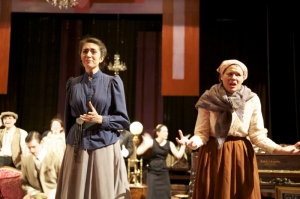 Mrs. Pearce is an oft-overlooked character. She runs the household and rolls her eyes, but an actress doesn’t get much else to work with. I mention her here to give kudos to the grad student, Megan A. Liles, who stood out as one of the best accents on stage. Her vocal and physical portrayals were complete, and I was impressed.
Mrs. Pearce is an oft-overlooked character. She runs the household and rolls her eyes, but an actress doesn’t get much else to work with. I mention her here to give kudos to the grad student, Megan A. Liles, who stood out as one of the best accents on stage. Her vocal and physical portrayals were complete, and I was impressed.
Griffin Candey as Freddy Eynsford-Hill was a real treat. And he had a tall order to fill: fall completely in love the second you see this young woman and then sing about it constantly. “On the Street Where You Live” is an ode to overwhelming, stupid, obsessive love, and Candey sings it beautifully. People stop and stare/they don’t bother me/for there’s nowhere else on Earth that I would rather be/Let the time go by/I won’t care if I/can be here on the street where you live. I don’t know how he did it, but he sold it.
I can’t possibly go over the entire play (especially since the first act was a solid two hours long), but I can say I was put off by the false advertising. This was not a “semi-staged/concert version” of My Fair Lady. This was My Fair Lady. If anything was cut, I am confounded to name it. It would have been great to see a stripped down version of the stage play with minimal dialogue and no scene changes. The performers are not to be blamed. For the most part, each carried his or her weight. But I didn’t walk in the door thinking I was being offered My Fair Lady, from top to bottom, with no omissions. I thought I was getting a concert, not a musical. Truly, twenty percent more or less staging would have been just right.
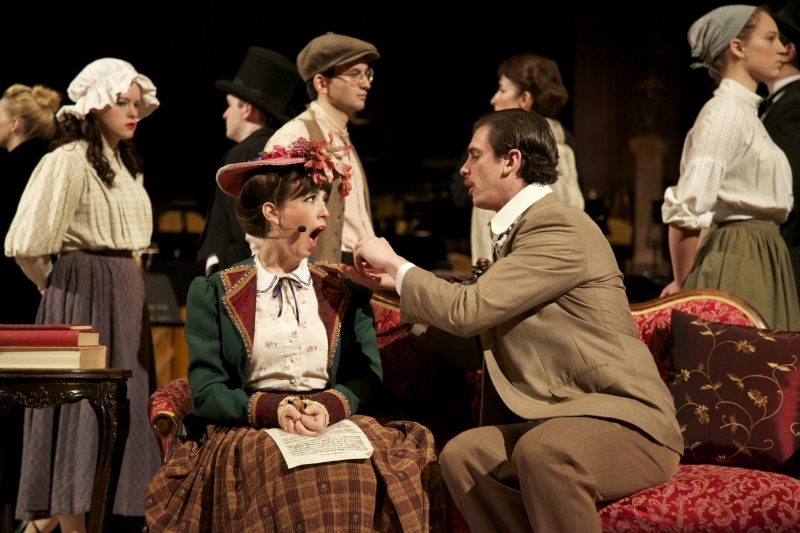
Regardless of whether or not this production was what I expected, it must be said that it was terribly successful. It was a beautifully costumed show, and the orchestra couldn’t be better suited for this project. The worst I can say is that I got the chance to hear all of my old favorites and see some great talent. Loverly.
Photos by Sean O’Connor








